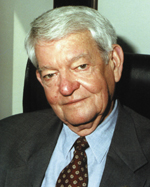This year�s gathering of the Virginia General
Assembly was the so-called �short� session, the shortness being its
duration of 45 days versus the 60 days that our state legislators normally
gather in even-numbered years. The �shortness� certainly also applies
to the state of the Commonwealth�s coffers, as well as to the lack of
legislative consensus on a wide array of issues.
But in case
you have not heard, the 2003 session was long on efforts to protect Virginia consumers,
especially with regard to the restructuring and deregulation of the
electric utility industry. In a yeoman effort, Manassas
Del. Harry Parrish ignored special interests and others who advocated
sailing forward into the uncertain seas of restructuring, and instead
shepherded through both Houses a bill that gives a breather to the
process.
|

Delegate
Harry Parrish--- His bill protects Virginia consumers. |
As mentioned
in last month�s editorial, this breather is welcome, and necessary. It
should help to protect Virginia consumers from the uncertain reliability
and potentially volatile pricing that would have occurred if the state�s
large utilities had been allowed to transfer control over their
transmission lines to a regional group that oversees the transmission of
electricity for several states.
Now, under Del. Parrish�s bill, the State
Corporation Commission (SCC) will study the impact on consumers of such
transfers of control over transmission lines. Because, once such transfers
take place, the state loses control over these transmission lines, since
regulatory oversight then falls to the federal government, and away from
the Commonwealth.
Del.
Parrish�s bill gives the SCC the opportunity to ensure that consumers
are not harmed in the process of these transfers, which are an
ingredient in the effort to develop regional electricity markets and spur
competition. Your electric cooperative leaders strongly supported Del. Parrish�s
bill, because we are concerned that moving forward too quickly toward
retail competition may end up costing consumers more than it ever saves
them.
Virginia�s 13 local electric cooperatives and the
350,000 homeowners and business-owners we represent constitute one of the
largest consumer groups in Virginia. Back when electric utility
restructuring became a hot topic in the mid-�90s, we
stated that we would support restructuring if � and only if � it
offered opportunities for savings to our members, all of our members, including
the hundreds of thousands of rural residential members served by electric
cooperatives. We have been firm in
this stance ever since.
While we are hopeful that, somewhere in the future,
retail competition could offer savings for the average electricity user,
we are concerned about the problems uncovered in other states that have
restructured, and are mindful of the many states that have moved away from
it in recent months. A cautious
approach seems to us to be the right approach.
Despite opposition from some quarters, Del.
Parrish�s bill passed both the House of Delegates and the Senate by wide
margins, proving yet again that our
state legislators of both political persuasions really do have the best
interests of consumers at heart.
The bill will not allow any utility operating in
Virginia to transfer control over its transmission lines to a regional
entity before July 1, 2004, at the earliest. The gift of time that Del.
Parrish and Virginia�s General Assembly have given to Virginia consumers
should help ensure that, if we sail forward into the seas of
restructuring, we�ll be better able
to provide protections to all those on board the ship.
You can be certain that your electric cooperative
will continue to guard your interests zealously as and if restructuring
moves forward. After all, you�re
not just a consumer of electricity; you�re a member-owner of an electric
cooperative.